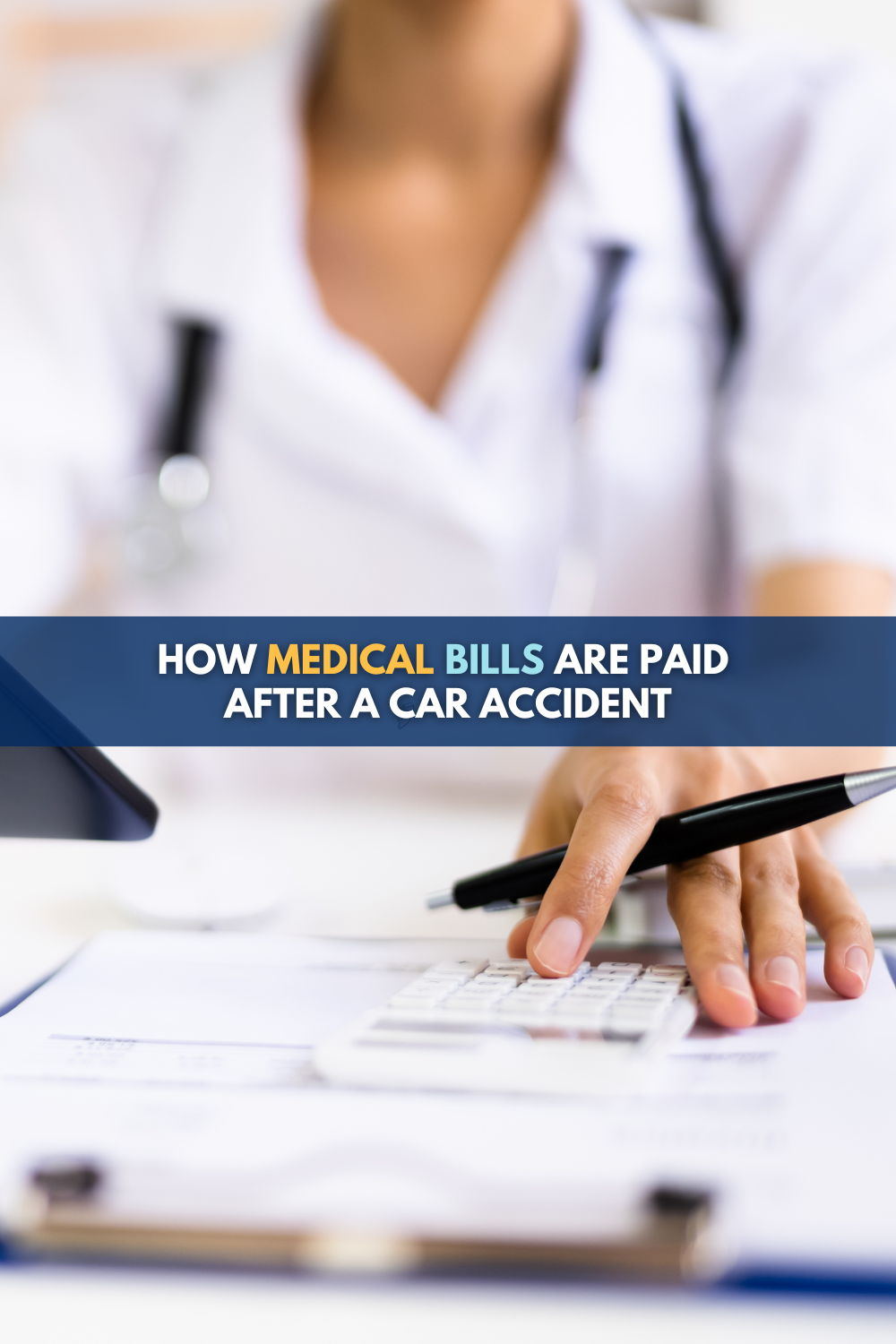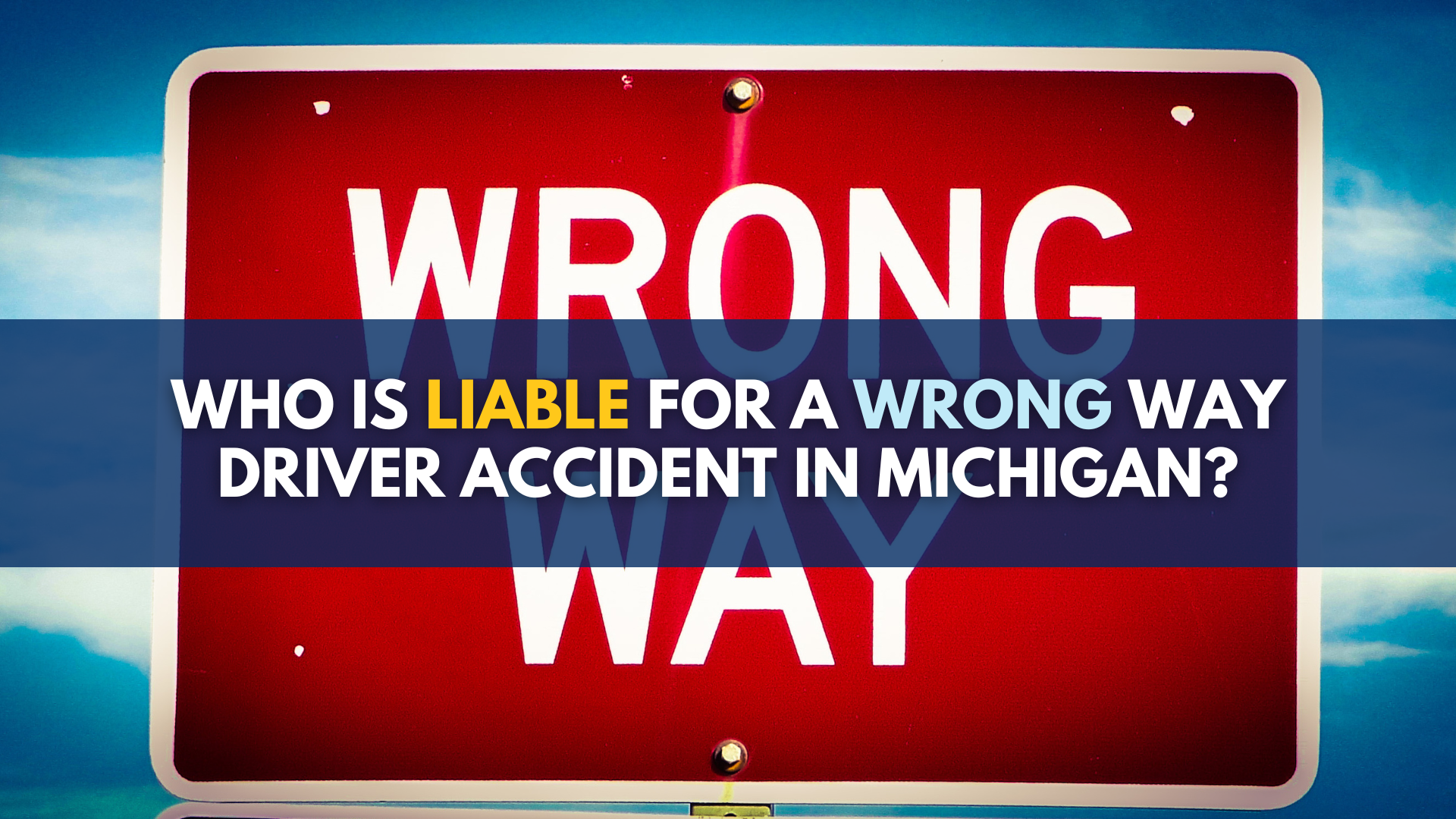
Figuring out how medical bills are paid after a car accident in Michigan is one of the most stressful challenges that people injured in an auto accident have to face.
The injuries, the pain, and the upending of our lives are all made worse by the worry of how you can pay for the medical care and treatment you’ve already received and the care you will need to recover. We worry about the EMS bill, the emergency room bill, the tests we’ve already had in the hospital and the treatment we will need. How are all of these medical bills after a car accident in Michigan going to be paid?
Below I will answer these questions and explain how under Michigan’s No-Fault auto insurance law people can get their medical bills paid after a car accident.
First step to getting medical bills paid after a car accident in Michigan
The first step to getting your medical bills paid after a car accident in Michigan – and protecting your legal rights under the No-Fault law is to file an application for No-Fault benefits with your auto insurance company.
We recommend that you file your No-Fault application IMMEDIATELY after the accident. If your application – which is also called a “written notice of injury” – is not filed “within 1 year after the accident,” then your claim for payment of medical costs and other No-Fault benefits will be automatically denied under Michigan law. (MCL 500.3145(1))
It’s important to include as much information as possible about the “nature of [your] injury” or injuries in the application. Failure to include necessary “injury” information in your application could result in your auto insurance company refusing to pay for treatment related to the injury, claiming that the injury must not be related to the accident because it wasn’t identified in your application for No-Fault benefits.
Who pays medical bills after a car accident in Michigan?
In Michigan, according to the No-Fault Law, medical bills are paid after a car accident by the responsible auto insurance company so it’s imperative that those statements get to the injured person’s No-Fault auto insurance company. (MCL 500.3105(1))
Provide your doctor and/or other medical providers with the name of your auto insurance company and your claim number.
The No-Fault law’s priority rules help an injured person determine which car insurance company will pay:
- If you have a No-Fault auto insurance policy in your name (i.e., you’re the “named insured”), then your insurance company will pay.
- If you don’t have your own No-Fault policy, then the auto insurance company for your spouse or a relative who lives in your home may pay.
- If you don’t have No-Fault coverage through any of those sources, then the Michigan Assigned Claims Plan will assign an insurance company to pay.
- If you are an Uber passenger and you don’t have No-Fault coverage through your own policy or the policy of a spouse or resident, then the auto insurance company that insures the Uber vehicle will pay. (MCL 500.3114(2))
- If you are injured in a car accident while occupying a vehicle provided by your employer (or your spouse’s or resident relative’s employer), then the auto insurance company that covers the “furnished vehicle” will pay. (MCL 500.3114(3))
- If you’re a motorcyclist and your injured in an accident with a car or truck, then the auto insurance company for either the driver or operator of the car or truck or the motorcycle – or the insurance company assigned by the Michigan Assigned Claims Plan – will pay.
How medical bills are paid after a car accident in Michigan
In Michigan, if you do not have your own auto insurance to pay your medical bills after a car accident, then your spouse’s insurer or the insurer of a relative who lives in your home will pay. If coverage is not available through those sources, then the Michigan Assigned Claims Plan will assign an insurer to pay.
Keep track of your medical statements
In addition to asking your medical providers to bill No-Fault, it’s important to keep track of your own medical statements, make copies for yourself and, most important of all, make copies of the submittals with a dated enclosure sheet showing when you sent them to your auto insurance company.
You can hire an auto accident attorney to collect and submit your medical statements on your behalf and to deal with your claims adjuster, but you can do this without having to hire an attorney.
But you must make sure they are submitted and PAID within one year of the date each bill is incurred or it will be time barred. IMPORTANT: If your medical statements are not submitted to your auto insurance company within one year from the date of treatment, then the auto insurance company will not be required to pay under Michigan’s auto law. (MCL 500.3145(2))
Will Workers’ Compensation pay?
In Michigan, medical bills are paid after a car accident by Workers’ Comp if you were injured in a car accident while working. (MCL 418.131; 418.301; 418.315)
Will my health insurance pay?
In Michigan, medical bills are paid after a car accident by your private health insurance if you have coordinated auto No-Fault insurance coverage. This means your health insurance will be the “primary payer”, being first to pay and, if and when that coverage is exhausted, then No-Fault will pick up from there with payments.
However, if you have uncoordinated auto insurance coverage – which is what our attorneys recommend (in addition to having unlimited No-Fault PIP medical benefits coverage) – where your No-Fault is primary to your health insurance coverage, then your auto No-Fault insurance company will be your first source of payment for your accident-related medical costs.
IMPORTANT: You may still end up having to rely on health insurance for payment of your accident-related medical costs if the auto insurance policy you have filed your claim under (1) provides for less than unlimited No-Fault PIP medical benefits coverage and (2) has a No-Fault PIP medical benefits coverage level that is insufficient to cover the full extent of your medical costs.
Will Medicare pay my medical bills after a car accident in Michigan?
In Michigan, historically, Medicare has not paid medical bills after a car accident for an injured victim because under federal law it is a “secondary payer”, which means it would not be the primary payer on medical costs associated with an accident if Michigan No-Fault coverage is available. In the event that Medicare did end up paying, its payments were “conditional,” meaning that Medicare would seek reimbursement from the victim.
Significantly, the Insurance Commissioner has stated in an official Bulletin that Medicare will cover auto accident injuries under the new coverage levels available in No-Fault auto insurance policies that are issued or renewed after July 1, 2020.
Will Medicaid pay my medical bills after a car accident in Michigan?
Like Medicare, Medicaid is a “secondary payer” under federal law. It is not supposed to be the “primary” pay for medical bills after a car accident in Michigan. But if Medicaid does end up paying, then it will seek reimbursement. If Medicaid is paying medical bills after a car accident in Michigan, then it is likely paying by mistake. This means an insurance company, whether that be an auto No-Fault insurer or a health insurer that has a higher priority to pay over Medicaid is not paying. You must let your attorney know immediately.
Will the at-fault driver pay my medical bills after a car accident in Michigan?
In Michiga, the at-fault driver can be liable to pay for a portion of your medical bills after a car accident once the new No-Fault PIP medical benefits coverage levels become available in auto insurance policies issued or renewed after July 1, 2020.
If an accident victim’s medical costs exceed the coverage level amount in the auto insurance policy under which the victim is seeking payment, then he or she can file a third-party, tort lawsuit against the at-fault driver for “excess” – as well as “future” – No-Fault PIP medical benefits to cover accident-related medical treatment. (MCL 500.3135(3)(c))
Will all of my medical bills be paid after a car accident in Michigan?
In Michigan, whether all of your medical bills are paid after a car accident will depend on three things:
- The No-Fault PIP medical benefits coverage level that was selected in the auto policy against which you have made a claim for payment of your accident-related medical treatment.
- Other sources of payment such as health insurance.
- Whether the at-fault driver has liability insurance coverage and/or personal assets to pay for your bills that are in “excess” of the No-Fault PIP medical benefits coverage level that applies to your claim.
Under the new No-Fault law, the amount of No-Fault PIP medical benefits that a car accident victim is entitled to will be limited by whatever coverage level was selected in the policy under which he or she is claiming No-Fault benefits. (MCL 500.3107c(5))
The coverage levels that will become available for all drivers in policies issued or renewed after July 1, 2020, include: (1) $50,000 for drivers on Medicaid; (2) $250,000; (3) $500,000; and (4) unlimited. (MCL 500.3107c(1)(a)) Additionally, drivers on Medicare can opt-out of No-Fault PIP medical benefits coverage completely. (MCL 500.3107d(1))
What if my insurance company won’t pay my medical bills after a car accident in Michigan?
In Michigan, if your auto insurance company refuses to pay medical bills after a car accident – or cuts-off payment of – No-Fault PIP medical benefits to cover your accident-related medial bills, then you may have to file a first-party, Michigan No-Fault insurance lawsuit seeking payment of unpaid, overdue benefits.
Generally, they are deemed to be “overdue” if the auto insurance company hasn’t paid them “within 30 days after” receiving “reasonable proof of the fact and of the amount of loss sustained.” (MCL 500.3142(2)) However, if a car accident victim doesn’t submit his or her medical statements to the insurance company “within 90 days after” treatment or care was “provided,” then your insurance company has 90 days to pay “before the [bills] are overdue.” (MCL 500.3142(3))
Significantly, you will only be able to sue if the dollar amount of your bills are less than the No-Fault PIP medical benefits coverage level in the policy under which you have made a claim. That’s because the insurance company is only liable for the bills up to the coverage level in the policy.
Being sent to collections
In some cases, accident victims have been sent to collections by their doctors or by medical providers for unpaid bills. To prevent this from happening, it is crucial that: (1) You file an application for auto No-Fault benefits, identifying all of your injuries; (2) Instruct your doctor to bill No-Fault; (3) Personally forward your medical costs to your No-Fault insurance company and your claims adjuster, keeping a copy of each dated submittal proving when it was submitted to your insurance company; (4) Talk to, and if necessary, hire a lawyer about unpaid, overdue bills if your auto insurance company has not paid within 30 days (or 90 days) of having been provided with the bills and reasonable receipt of proof.
Remember you only have one year from the date of a medical service or treatment to sue your auto insurance company for payment. (MCL 500.3145(2))
Keep in mind that while any lazy biller for a doctor’s office or a provider who is unfamiliar with Michigan No-Fault can try to send you to collections for medical bills after a car accident, but in Michigan you are protected from having to pay on balance billings. Your own insurance company is responsible to pay what they consider a reasonable charge. If there is still a disputed amount and a medical office is threatening to send you to collections over unpaid balance billings, then your own insurance company is required to hire a lawyer to defend you and pay any differential amount. Therefore, any collection notices that you receive should be forwarded immediately to your auto insurance company.
If for whatever reason, such as too much time has passed to pursue a lawsuit against your auto insurance company or the bill was never properly submitted to your insurer within one year of the date incurred, you can always try to settle the bill once it is in collections. Often, collection companies work on percentages of what is paid, since the doctor or hospital has likely written off the amount already once it goes into collections. They will usually negotiate in your favor on the final repayment amount.
No balance billing
If your doctor or medical provider sends you a bill for the difference between what they charged for their medical services and what they received in payment from your No-Fault auto insurance company, do not pay for it.
This is called “balance billing” and it is inconsistent with the No-Fault law’s “reasonable charge” requirements for billing of medical costs, as explained in the Michigan Court of Appeals in its 1994 ruling in McGill v. Automobile Association of Michigan.
Additionally, under the new No-Fault law, a doctor or medical provider who has an issue with the payment “may make a claim and assert a direct cause of action against an insurer . . . to recover overdue benefits payable for charges for products, services, or accommodations provided to an injured person.” (MCL 500.3112)
Injured in a car accident in Michigan? Call the attorneys at Michigan Auto Law now!
If you were injured in a car accident in Michigan, call now (855) 781-7747 for a free consultation with one of our experienced car accident lawyers. There is no cost or obligation. You can also visit our contact page or use the chat feature on our website.
Michigan Auto Law is Michigan’s largest and most successful law firm that specializes exclusively in helping people who have been injured in auto accidents.
Our secret? Our car accident attorneys deliberately handle fewer cases than other personal injury law firms. This allows us to focus more time and attention on our cases.
Unlike other law firms, attorneys are never too busy to promptly return phone calls and answer questions.
We have more than 2,000 5-Star Reviews that reflect this care and attention to detail.
More importantly, this client-focused approach leads to better and faster settlements for our clients. Michigan Auto Law has recovered more million-dollar settlements and trial verdicts for motor vehicle accidents than any other lawyer or law firm in Michigan. We’ve also recovered the highest ever reported truck accident and car accident settlement in the state.
Call now so we can start making a real difference for you.






